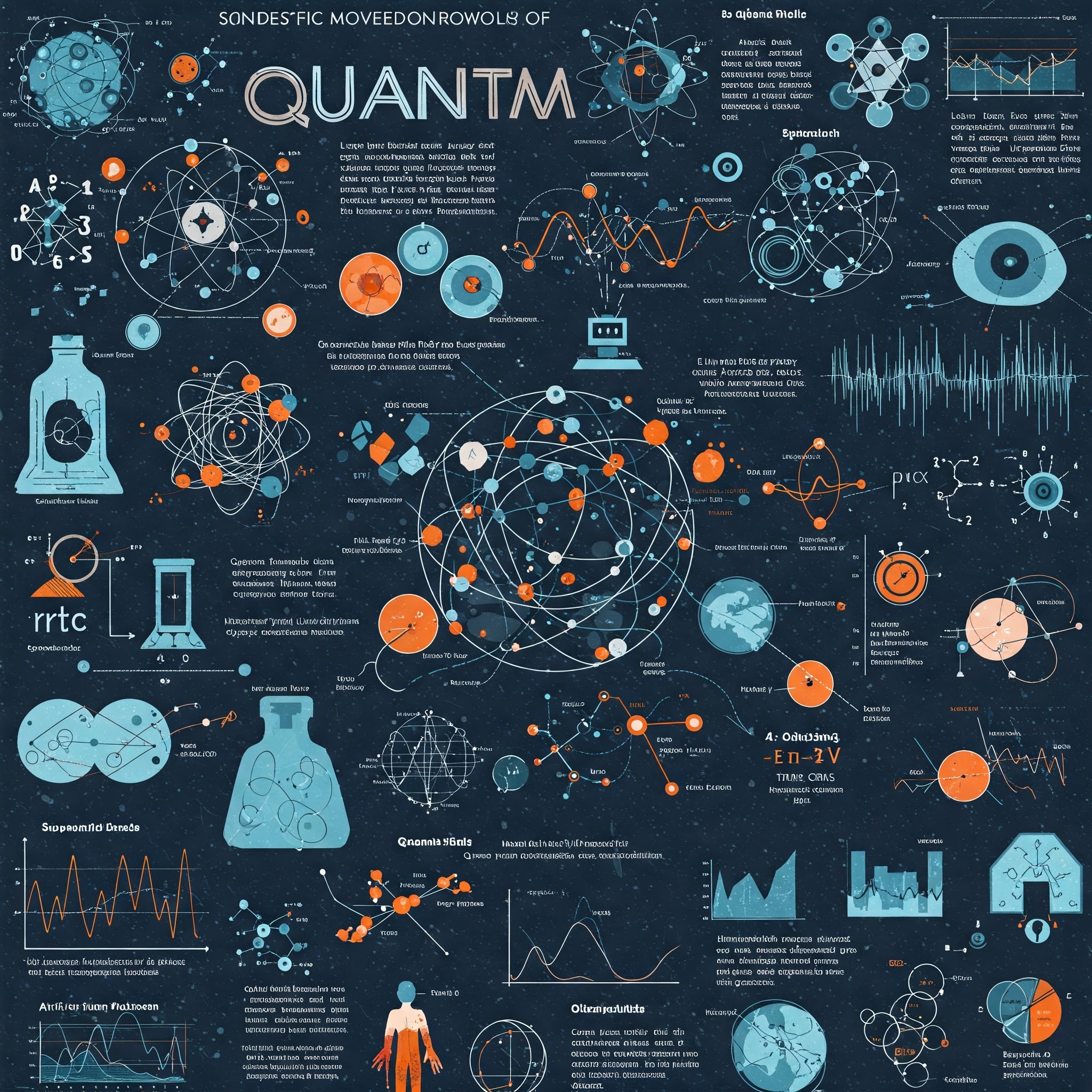The quantum realm refers to the scale at which quantum mechanical effects become significant, typically at the level of atoms and subatomic particles. This realm is governed by the principles of quantum mechanics, a fundamental theory in physics that provides a description of the physical properties of nature at this scale.
The quantum realm is a place where the rules of classical physics break down, and the world behaves in strange and counterintuitive ways. Here’s a glimpse into the scientific knowledge and beliefs about this fascinating realm:
Scientific Knowledge:
Quantum mechanics: This is the overarching theory that governs the quantum realm. It describes the behavior of matter and energy at the atomic and subatomic levels, introducing concepts like quantization, wave-particle duality, and uncertainty.
Fundamental forces and particles: Quantum field theory combines quantum mechanics with special relativity to explain the fundamental forces of nature (electromagnetism, strong and weak nuclear forces) and the elementary particles that make up matter (quarks, leptons).
Quantum phenomena: Scientists have observed and experimentally verified many quantum phenomena, including superposition, entanglement, tunneling, and spin. These phenomena have led to technological advancements like lasers, transistors, and MRI machines.
Beliefs and Open Questions
Interpretation of quantum mechanics: There are different interpretations of quantum mechanics, such as the Copenhagen interpretation and the many-worlds interpretation, which offer varying perspectives on the nature of reality and measurement in the quantum realm.
Quantum gravity: One of the biggest challenges in physics is unifying quantum mechanics with general relativity to create a theory of quantum gravity, which would describe the universe at its most fundamental level and explain phenomena like black holes and the Big Bang.
Quantum consciousness: Some scientists speculate that quantum mechanics might play a role in consciousness, but this is a highly debated topic with no definitive evidence.
Overall:
Quantum realm is real: Despite its strangeness, the quantum realm is not just a theoretical construct. It’s a fundamental aspect of reality that has been confirmed by countless experiments and observations.
Ongoing research: Scientists are constantly exploring the quantum realm, seeking to deepen our understanding of its mysteries and unlock its potential for future technologies.
Quantum technology: Quantum technologies like quantum computing and quantum cryptography are rapidly advancing, promising to revolutionize various fields in the near future.
Here are some key scientific knowledge and beliefs about the quantum realm:
1. Wave-Particle Duality: Particles at the quantum level, such as electrons and photons, exhibit both wave-like and particle-like properties. This duality is a cornerstone of quantum mechanics and is demonstrated in experiments like the double-slit experiment.
2. Quantization: Certain properties, such as energy, take on only discrete values. For example, electrons in an atom occupy specific energy levels and can jump between these levels by emitting or absorbing quanta of energy in the form of photons.
3. Uncertainty Principle: Formulated by Werner Heisenberg, this principle states that there is a fundamental limit to the precision with which certain pairs of physical properties, like position and momentum, can be known simultaneously.
4. Superposition: Quantum systems can exist in multiple states at once until they are measured. This is famously illustrated by Schrödinger’s cat, a thought experiment in which a cat in a box is simultaneously alive and dead until the box is opened.
5. Entanglement: Quantum entanglement is a phenomenon where particles become interconnected, and the state of one instantly influences the state of another, no matter the distance separating them. This “spooky action at a distance” (as Einstein called it) has been experimentally validated and is a key resource for quantum information science.
6. Quantum Tunneling: Particles can pass through potential barriers that they classically shouldn’t be able to surmount. This effect is crucial in many physical phenomena, including nuclear fusion in stars and semiconductor operation in electronics.
7. Quantum Field Theory: This is a theoretical framework that combines classical field theory, special relativity, and quantum mechanics. It is used to construct quantum mechanical models of systems with an infinite number of degrees of freedom, such as the electromagnetic field.
8. Interpretations of Quantum Mechanics: There are several interpretations of quantum mechanics, such as the Copenhagen interpretation, many-worlds interpretation, and pilot-wave theory, each offering a different perspective on the fundamental nature of the quantum realm.
9. Quantum Computing: Leveraging the principles of superposition and entanglement, quantum computing aims to perform certain types of computations much more efficiently than classical computers.
10. Quantum Decoherence: This is the process by which quantum systems lose their quantum behavior as they interact with their environment, leading to the classical behavior observed at macroscopic scales.
11. Quantum Coherence: This refers to the maintenance of a consistent phase relationship in the wave function of a quantum system. Coherence is essential for phenomena like superconductivity and superfluidity, and it is a critical factor in the development of quantum computers.
12. Quantum Zeno Effect: This effect occurs when a quantum system’s evolution is hindered by frequent measurements. It is named after Zeno’s paradoxes, which suggest that a moving object cannot change its state if it is constantly observed.
13. Quantum Hall Effect: Discovered by Klaus von Klitzing, this effect occurs in two-dimensional electron systems subjected to low temperatures and strong magnetic fields, leading to quantized Hall resistance. It has implications for the precision measurement of physical constants.
14. Topological Quantum States: These are quantum states of matter that are protected against local perturbations due to global properties of the system. Topological insulators and superconductors are examples where such states are of great interest for their potential applications in robust quantum computing.
15. Quantum Gravity: This is an area of theoretical physics that seeks to describe gravity according to the principles of quantum mechanics. It aims to reconcile general relativity, which describes the gravitational force, with quantum mechanics.
16. Quantum Information Theory: This field studies the processing and transmission of information using quantum systems. It includes the study of quantum cryptography, quantum teleportation, and quantum error correction.
17. Quantum Sensing and Metrology: Quantum systems can be used to make extremely precise measurements. Quantum sensors exploit quantum coherence and entanglement to measure physical quantities like time, gravity, magnetic fields, and more with unprecedented precision.
18. Quantum Thermodynamics: This emerging field extends classical thermodynamics to systems governed by quantum mechanics. It explores the flow of energy and information in quantum systems and has implications for the efficiency of quantum machines.
19. Quantum Simulations: Quantum systems can be used to simulate other quantum systems, which is particularly useful for understanding complex molecules and materials that are difficult to study with classical computers.
20. Quantum Foundations: This area deals with the fundamental questions of quantum mechanics, such as the measurement problem, the nature of quantum states, and the transition from quantum to classical behavior.
21. Quantum Biology: This field investigates whether quantum phenomena play a role in biological processes, such as photosynthesis, enzyme action, and bird navigation.
22. Quantum Materials: These are materials that exhibit exotic quantum properties, such as high-temperature superconductivity, quantum spin liquids, and Weyl semimetals.
23. Quantum Networks: The development of networks that use quantum entanglement to connect quantum processors and enable secure communication over long distances.
24. Quantum Optics: This field studies the interaction between light (photons) and matter at the quantum level, leading to technologies like lasers and quantum imaging.
25. Quantum Chaos: This area studies the quantum manifestations of classical chaos, where small changes in initial conditions lead to vastly different outcomes.
Beliefs about the quantum realm often intersect with philosophical questions about the nature of reality, determinism, and the role of the observer. While the mathematical framework of quantum mechanics is incredibly successful at predicting experimental results, the interpretation of what it means for the nature of reality is still a subject of debate and research.
The quantum realm is not just a theoretical playground; it has practical implications that are already impacting technology, such as in the development of quantum computers, secure communication systems, and advanced materials. As research progresses, our understanding of the quantum realm continues to deepen, leading to new technologies and insights into the fundamental workings of the universe.
The quantum realm is a frontier of scientific exploration, pushing the boundaries of our knowledge and challenging our classical intuitions. While much remains unknown, the ongoing research and technological advancements in this field hold immense promise for the future.





















